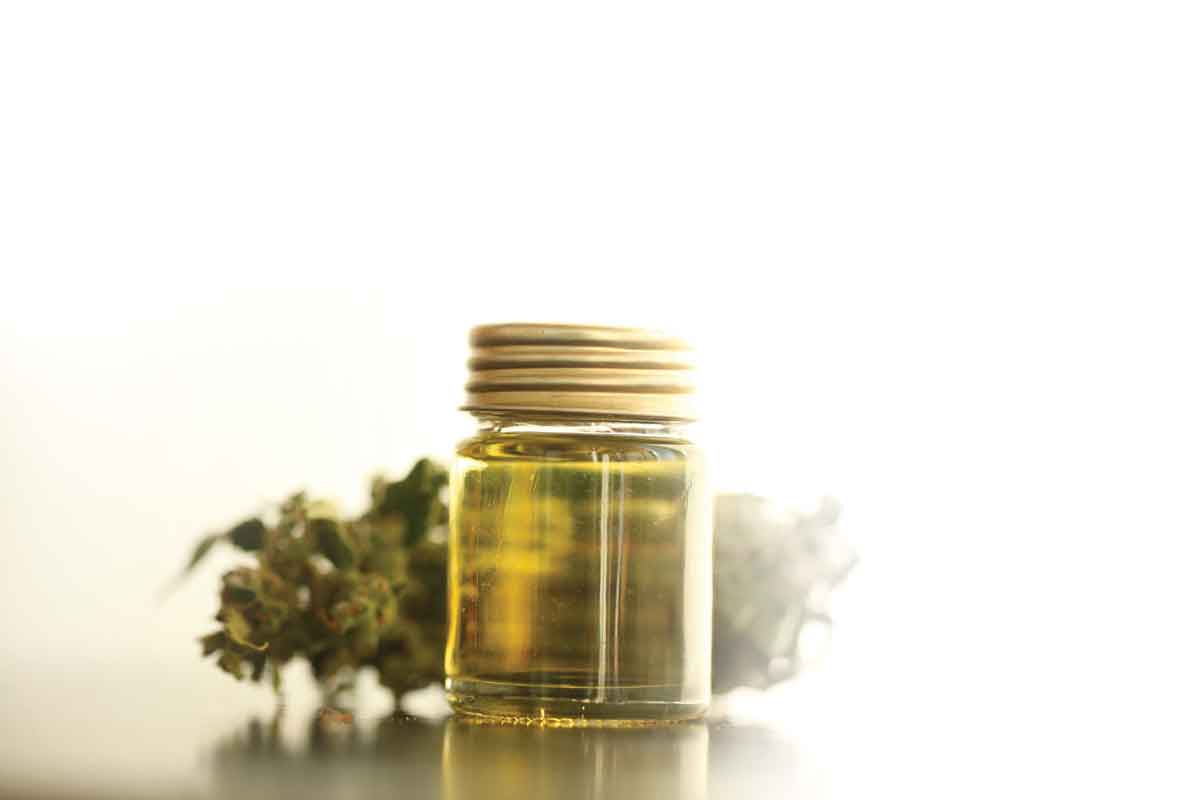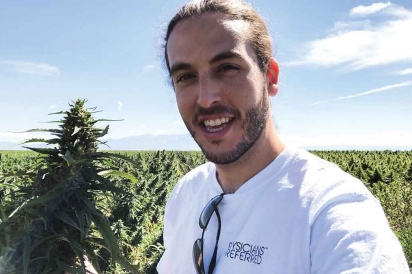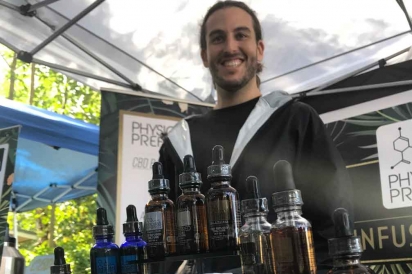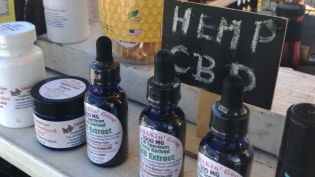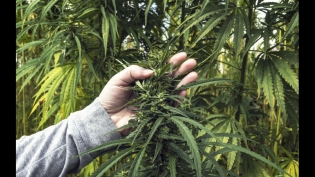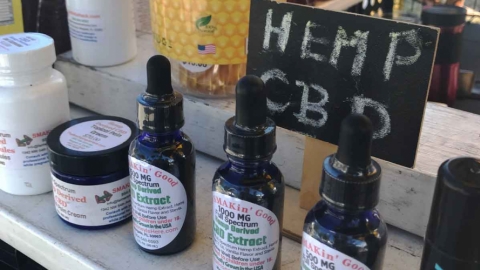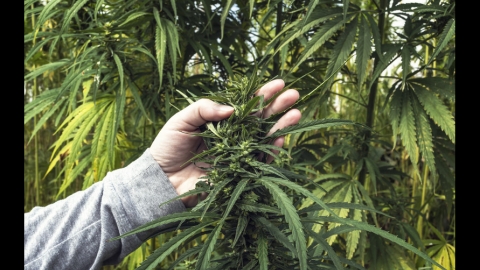The ABCs of CBD
Need to chill? Relieve aches and pains? Get a good night’s sleep? Instead of reaching for a pill bottle, try a cookie or a kombucha infused with CBD.
Stroll among the stalls under the trees at the Coconut Grove Farmers Market on Saturdays and you may discover that the hottest products being sold by the vendors – kombucha, elixirs, even cookies – contain CBD, scientifically known as “cannabidiol,” one of the chemical compounds found in the marijuana or hemp plant (Cannabis sativa). Unlike tetrahydrocannabinol (THC), the main psychoactive cannabinoid that gets users high, CBD is non-intoxicating. It’s being used to treat conditions ranging from simple aches and pains to more serious conditions.
One of those vendors is Michael Oria of Physicians Preferred, a CBD oil supplier. He sells pain-relief creams, tinctures and specialized oils for those who have acne, joint pain, menstrual pain and sleep issues. “People try it for anxiety instead of Xanax, or for sleep problems instead of Ambien,” he says.
A Miamian whose family has agricultural roots here, Oria, 32, says his own autoimmune disease prompted his interest in CBD several years ago. He moved to Colorado and, with his family, started a small hemp farm. Today, he says the farm has grown to 900 acres, follows organic practices and no pesticides or herbicides. Their extracts go through rigorous third-party testing to ensure high quality. The oils are shipped to their facility in Boca Raton for final processing. About a year ago, they launched the consumer-focused part of their business, participating in events to educate the public about the uses of CBD.
“People wonder if it’s snake oil – how can it do so much?” he says, pointing to applications in neurological illnesses, diabetes, IBD, cancers, nausea and vomiting, pain and inflammation, anxiety and depression. Customers buy it and often return. “They give it a shot, they keep using it, they thank me,” he says.
Universal Appeal for CBD Products
Interestingly, CBD products attract all ages. Oria says his target customers are women 35-65. While many CBD-infused products, like cookies, appeal to a younger crowd just looking for its relaxing effects., they’re also finding favor with older people who have experienced health benefits. Gary Kareff, who sells local honey at farmers markets in Broward County, is one of those people. “I started using CBD personally to help me sleep throughout the night,” he says. The taste wasn’t especially appetizing, “but when combined with honey, it is way more palatable.” The honey can be used to alleviate aches, pains, anxiety and sleeplessness. “There aren’t any bad side effects,” he says. “Rather there are side benefits.”
Kareff went to a natural product show in Baltimore, which “really opened our eyes to CBD and how it can be used on a day-to-day basis,” he says. This led to the creation of CBD-infused honey, which he sells at his booths at markets, including the Community Farmers Markets of South Florida, four Broward markets he runs with colleagues Jerry Kugel of Happy Dog Bakery and Jonathan Grotsky of JW Pastry.
Kugel found a use for hemp drops in his inventory of healthy pet treats. “Over the last 10 years we’ve been selling all-natural dog treats and roasted bones,” he says. “We began to hear concerned dog owners talk about how their dogs are super-hyper and anxious, which led to the introduction of the hemp drops.” To administer the drops, he says, “you apply them twice a day under the dog’s tongue where the receptors are. The number of drops is based on the size and weight of the dog.”
Consumers can find CBD not only in tincture form, but in cookies at Mima’s Market, an artisan shop in Miami Shores that works closely with local chefs, makers and artists who consider the well-being of both consumers and the environment in choosing sustainable materials, ingredients and packaging. One of the brands that ticks off all of these boxes, says co-founder Alexandra Cava Palomino, is Courtney’s Cookies.
Owner Courtney León makes nutritious, allergen-free, vegan, low-glycemic and gluten-free cookies, which she sells at farmers markets and retailers. In May, she added two CBD cookies, which are becoming so popular she says she may add other flavors.
Another company that sells CBD-infused snacks is Muz Muz, a provider of organic full-spectrum hemp goods set to launch in Miami in 2019. “We sell hemp-infused banana bites known as ‘Banana Buddies,’” says creator Mikael Kadosh. The company started sampling their treats at Art Basel in December.
Other CBD-infused products sold locally include cold-brew coffee, kombucha and elixirs. Consumers can expect to be exposed to even more CBD products in ads and commercials, says Oria, one of the results of the new 2018 Farm Bill, which says hemp (cannabis with a very low concentration of THC) is no longer an illegal substance. Consumers should read labels and do their research. Oria’s advice? “Look for companies that do outreach for education.”
CBD FAQs
What's CBD? Cannabidiol, one of the key compounds in the cannabis plant.
What's THC? Tetrahydrocannabinol, the key compound in cannabis that’s considered psychoactive – it gets people high. If a plant has .3 percent or less THC, it’s considered “industrial hemp” and can be used for oils and tinctures. Greater than that, it’s considered marijuana and subject to different laws.
What's the difference between hemp and marijuana? These are two forms of the cannabis plant. Marijuana has much more THC than hemp. Hemp oil refers to oil made from the seeds of the plant. CBD oil is made from leaves, resin or the flowering tops of the plant.
How do you use it? CBD is available in topical lotions, via a vape pen, in drops and in food and drink.
What does it taste like? Drops, placed under the tongue, have a mild, grassy flavor. It’s not detectable when added to food or drink.
Is it safe? If you’re pregnant or breastfeeding, talk to your doctor before trying CBD.
Is it expensive? Depending on its strength, tinctures or drops of CBD can range from $25 per vial upwards. Expect to pay a few dollars more for a food product (cookie, bottle of kombucha) made with CBD.
Is it legal? In Florida, CBD and medical THC (recommended by physicians to treat epilepsy, cancer, chronic pain, glaucoma and other conditions and sold at licensed dispensaries) are legal; marijuana for recreational use is not. While the federal government classifies marijuana as an illegal drug, under the new Farm Bill, hemp – defined as cannabis with very low concentrations of THC – is no longer an illegal substance. Florida’s new agriculture commissioner, Nikki Fried, a former marijuana lobbyist, says the bill will allow hemp production outside of a university-sanction pilot program, opening up a multi-billion dollar industry.


